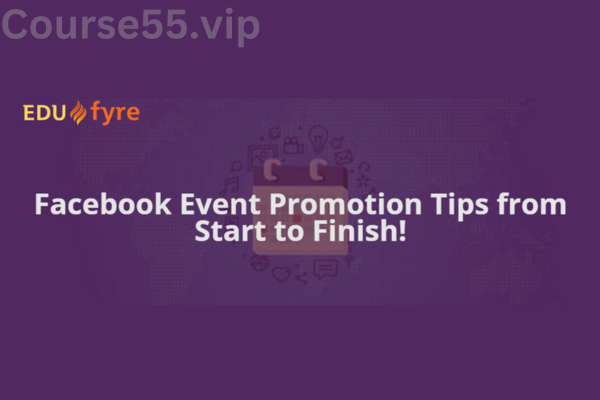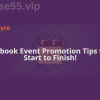Facebook Event Promotion Tips from Start to Finish By Jerry Banfield with EDUfyre
$199.00 Original price was: $199.00.$23.10Current price is: $23.10.
Facebook Event Promotion Tips from Start to Finish by Jerry Banfield with Edufyre: A Comprehensive Review – Digital Download!
Facebook Event Promotion Tips from Start to Finish By Jerry Banfield with EDUfyre
Overview

Mastering Facebook Event Promotion: A Detailed Course Review by Jerry Banfield with Edufyre
In today’s digital landscape, successfully promoting events on Facebook can significantly impact their reach and attendance. Jerry Banfield’s course, “Facebook Event Promotion Tips from Start to Finish,” provides in-depth strategies and hands-on insights to help individuals maximize their event marketing efforts on this popular social media platform. Combining expert advice with real-life experiences, Banfield delivers a course that is both educational and relatable. For those eager to refine their event promotion skills, this course offers valuable techniques to enhance visibility and engagement.
Designed to cater to both beginners and seasoned marketers, the course covers essential and advanced promotional strategies. It takes learners through each stage of event marketing, from setup to audience engagement. Below, we explore the key elements covered in the course, offering practical takeaways for effectively managing and promoting events on Facebook.
Understanding Facebook Events and Their Potential
The course begins by breaking down the fundamentals of Facebook events. Banfield explains what constitutes a Facebook event and explores different types, including public meetups, private gatherings, and community-driven occasions. By understanding these distinctions, participants can determine the best approach for their specific needs.
• Who Can Create Events? Since anyone with a Facebook account can create an event, this feature serves as a powerful tool for individuals, businesses, and organizations. Banfield highlights the importance of selecting the right event settings—public or private—depending on the audience and desired level of engagement.
• Discovering and Engaging with Events: A key aspect of Facebook event marketing is identifying relevant existing events. Banfield discusses strategies for exploring Facebook’s event discovery features, allowing marketers to engage with audiences who share similar interests, thereby expanding their promotional reach organically.
Step-by-Step Guide to Creating a Facebook Event
Once the fundamentals are clear, Banfield walks students through the process of setting up an event effectively. He focuses on the essential components that make an event listing appealing and successful.
• Selecting an Engaging Visual: The course stresses the impact of high-quality images in capturing attention. Banfield advises using compelling visuals that align with the event’s theme to attract potential attendees.
• Writing an Effective Event Description: A well-crafted description serves as a promotional tool. Banfield encourages event planners to highlight the unique aspects of their event while emphasizing the benefits of attending, ensuring the content resonates with the intended audience.
• Choosing the Right Time and Venue: Timing and location significantly influence attendance. Banfield provides insights into audience behavior, recommending optimal days and times for events—such as weekday evenings or weekends—to maximize participation.
Mastering these initial steps ensures a strong foundation for a successful event.
Effective Strategies for Event Promotion
Once the event is created, the next crucial step is effective promotion. Banfield outlines several impactful strategies to increase reach and engagement.
• Sending Personalized Invitations: Instead of relying solely on automated invites, Banfield recommends personally inviting friends and followers. A personal touch can encourage greater commitment from potential attendees.
• Leveraging Facebook Groups: Sharing events within relevant Facebook groups can significantly enhance visibility. Targeting niche communities with an interest in the event topic can lead to organic growth in attendance.
• Optimizing Facebook’s Invite Features: Banfield explains how to use Facebook’s invitation tools strategically by segmenting contacts and tailoring messages to different audience groups for better engagement.
By combining these promotional techniques, event organizers can effectively amplify their event’s reach and attract a larger audience.
Using Facebook Ads to Boost Event Visibility
Facebook advertising plays a pivotal role in event promotion, and Banfield dedicates a section of the course to optimizing ad strategies for maximum impact.
• Navigating Facebook Ads Manager: The course offers a step-by-step tutorial on setting up event promotions using Ads Manager, covering objectives, budgeting, and audience targeting.
• Testing Different Ad Creatives: Banfield emphasizes the importance of split-testing multiple ad variations to determine which images and messages resonate best with different audiences.
• Targeting the Right Audience: Understanding demographics is essential. By refining audience segments based on age, location, and interests, marketers can create highly targeted campaigns that increase event attendance.
With the right advertising strategy, event organizers can expand their reach and attract a broader audience effectively.
Engaging Your Audience Before the Event
Keeping attendees interested in the lead-up to the event is crucial for maintaining enthusiasm and ensuring strong turnout. Banfield highlights several engagement techniques.
• Encouraging Event Page Discussions: Interactive discussions on the event page foster a sense of community and anticipation. Allowing attendees to share their thoughts and ask questions enhances their investment in the event.
• Posting Regular Updates: Sharing updates about guest speakers, event activities, or special announcements keeps potential attendees informed and engaged. Banfield suggests strategic timing for these updates to maintain interest.
• Building Excitement with Interactive Content: Countdown posts, teaser videos, and behind-the-scenes glimpses can generate excitement. Visual content is particularly effective in capturing attention and encouraging attendees to invite friends.
By maintaining active engagement, event organizers can sustain interest and ensure a lively atmosphere on the event day.
Analyzing and Improving Future Promotions
The course concludes with a focus on post-event analysis, helping marketers refine their strategies for future event promotions.
• Collecting Attendee Feedback: Gathering input from attendees through surveys or discussions provides valuable insights for improvement.
• Evaluating Campaign Performance: Analyzing advertising results and promotional efforts helps identify what worked well and what can be optimized for future events.
• Adjusting Strategies for Future Success: Based on feedback and data analysis, Banfield encourages adapting promotional tactics to better align with audience preferences, ensuring continuous improvement.
This reflective process helps marketers enhance their promotional approach and increase event success over time.
Personal Insights and Real-World Experiences
Throughout the course, Banfield shares personal stories from his own event promotions. He discusses challenges he faced and lessons learned, providing relatable and practical insights for students. His transparency about past missteps and growth serves as motivation for learners, reinforcing the idea that trial and error is part of the journey to mastering event marketing.
Final Thoughts: Is This Course Worth It?
Jerry Banfield’s “Facebook Event Promotion Tips from Start to Finish” serves as an extensive guide for anyone looking to improve their event marketing skills. By blending expert strategies with real-life experiences, Banfield equips students with the tools to effectively engage audiences and drive event attendance.
From crafting compelling event pages to utilizing advanced promotional techniques, this course offers a well-rounded approach to Facebook event marketing. Whether you’re a beginner or a seasoned marketer, the insights provided can help refine your strategies and lead to greater event success.
For those aiming to maximize their event reach and effectiveness, this course delivers actionable techniques that can elevate digital marketing efforts in the ever-growing social media space.
Frequently Asked Questions:
Business Model Innovation: We operate a group buying strategy, allowing participants to share costs and access popular courses at reduced prices. This model benefits individuals with limited financial resources, despite concerns from content creators about distribution methods.
Legal Considerations: The legality of our operations involves complex issues. Although we don’t have explicit permission from course creators to resell their content, there are no specific resale restrictions stated at the time of purchase. This ambiguity creates an opportunity for us to provide affordable educational resources.
Quality Control: We ensure that all course materials purchased are identical to those offered directly by the creators. However, it’s important to understand that we are not official providers. As such, our offerings do not include:
– Live coaching calls or sessions with the course author.
– Access to exclusive author-controlled groups or portals.
– Membership in private forums.
– Direct email support from the author or their team.
We aim to reduce the cost barrier in education by offering these courses independently, without the premium services available through official channels. We appreciate your understanding of our unique approach.
Be the first to review “Facebook Event Promotion Tips from Start to Finish By Jerry Banfield with EDUfyre” Cancel reply
You must be logged in to post a review.

 The Marriage Reset: From Obligation To Adventure By Dani Johnson
The Marriage Reset: From Obligation To Adventure By Dani Johnson  The Complete Crowdfunding PR System By Salvador Briggman - CrowdCrux
The Complete Crowdfunding PR System By Salvador Briggman - CrowdCrux  Understanding the Needs of the Dying: Bringing Hope, Comfort and Love to Life's Final Chapter By David Kessler - PESI
Understanding the Needs of the Dying: Bringing Hope, Comfort and Love to Life's Final Chapter By David Kessler - PESI 













Reviews
There are no reviews yet.